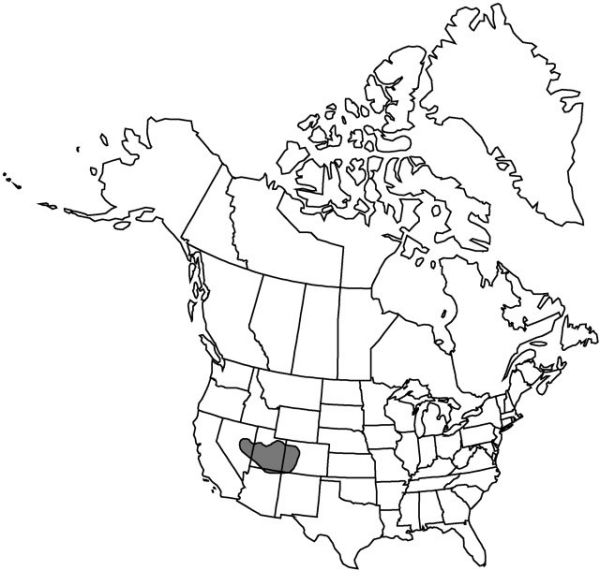Difference between revisions of "Yucca harrimaniae"
Rep. (Annual) Missouri Bot. Gard. 13: 59, plates 28, 29, plate 83, fig. 10, plate 93, fig. 1. 1902.
FNA>Volume Importer |
FNA>Volume Importer |
||
| Line 11: | Line 11: | ||
|name=Yucca gilbertiana | |name=Yucca gilbertiana | ||
|authority=(Trelease) Rydberg | |authority=(Trelease) Rydberg | ||
| − | }}{{Treatment/ID/Synonym | + | }} {{Treatment/ID/Synonym |
|name=Yucca harrimaniae var. gilbertiana | |name=Yucca harrimaniae var. gilbertiana | ||
|authority=Trelease | |authority=Trelease | ||
| − | }}{{Treatment/ID/Synonym | + | }} {{Treatment/ID/Synonym |
|name=Yucca harrimaniae var. sterilis | |name=Yucca harrimaniae var. sterilis | ||
|authority=Neese & S. L. Welsh | |authority=Neese & S. L. Welsh | ||
| Line 32: | Line 32: | ||
|elevation=1000–2500 m | |elevation=1000–2500 m | ||
|distribution=Ariz.;Colo.;Nev.;N.Mex.;Utah. | |distribution=Ariz.;Colo.;Nev.;N.Mex.;Utah. | ||
| − | |discussion=<p>S. D. McKelvey (1938–1947) included Yucca neomexicana in Y. harrimaniae, as did J. L. Reveal (1977c), who gave it varietal status. K. H. Clary’s (1997) DNA studies contributed to a consensus tree in which Y. harrimaniae and Y. neomexicana are discrete and widely separated. These taxa are allopatric, separated by the San Juan Mountains of Colorado, and this along with Clary’s evidence supports their recognition as separate species.</p> | + | |discussion=<p>S. D. McKelvey (1938–1947) included <i>Yucca neomexicana</i> in <i>Y. harrimaniae</i>, as did J. L. Reveal (1977c), who gave it varietal status. K. H. Clary’s (1997) DNA studies contributed to a consensus tree in which <i>Y. harrimaniae</i> and <i>Y. neomexicana</i> are discrete and widely separated. These taxa are allopatric, separated by the San Juan Mountains of Colorado, and this along with Clary’s evidence supports their recognition as separate species.</p> |
|tables= | |tables= | ||
|references= | |references= | ||
| Line 56: | Line 56: | ||
|publication year=1902 | |publication year=1902 | ||
|special status= | |special status= | ||
| − | |source xml=https://jpend@bitbucket.org/aafc-mbb/fna-data-curation.git/src/ | + | |source xml=https://jpend@bitbucket.org/aafc-mbb/fna-data-curation.git/src/8f726806613d60c220dc4493de13607dd3150896/coarse_grained_fna_xml/V26/V26_900.xml |
|genus=Yucca | |genus=Yucca | ||
|species=Yucca harrimaniae | |species=Yucca harrimaniae | ||
Revision as of 17:47, 18 September 2019
Plants cespitose, forming dense to open colonies, acaulescent or short-caulescent; rosettes usually small, asymmetrical or symmetrical. Stems to 0.3 m. Leaf blade pale green, linear- or spatulate-lanceolate, concavo-convex, widest near middle, 30–50 × 1.8–4.3 cm, rigid, margins entire, filiferous, white or brown, apex pungent. Inflorescences racemose, rarely paniculate proximally, arising within or just beyond rosettes, 3.5–7 dm; branches, when present, few, short; bracts erect, proximal to 20 cm, distal 5–8 cm; peduncle scapelike, 0.1–0.2 m, less than 2.5 cm diam. Flowers pendent; perianth broadly campanulate; tepals distinct, yellow or greenish yellow, usually tinged purple, broadly lanceolate, 4–5(–5.3) × 1.6–3.4 cm; filaments 1.6–2.8 cm; pistil pale green, 2.7–3.8 × 0.4–0.8 cm; style pale to bright green, 9–13 mm; stigmas lobed. Fruits erect, capsular, dehiscent, cylindrical, usually deeply constricted toward center, 3–5(–5.5) × 2–3 cm, dehiscence septicidal. Seeds dull black, thin, 5–8 × (3.5–)4–8 mm.
Phenology: Flowering spring–early summer.
Habitat: Desert slopes, foothills, and plateaus in limestone and volcanic outcrops
Elevation: 1000–2500 m
Distribution

Ariz., Colo., Nev., N.Mex., Utah.
Discussion
S. D. McKelvey (1938–1947) included Yucca neomexicana in Y. harrimaniae, as did J. L. Reveal (1977c), who gave it varietal status. K. H. Clary’s (1997) DNA studies contributed to a consensus tree in which Y. harrimaniae and Y. neomexicana are discrete and widely separated. These taxa are allopatric, separated by the San Juan Mountains of Colorado, and this along with Clary’s evidence supports their recognition as separate species.
Selected References
None.